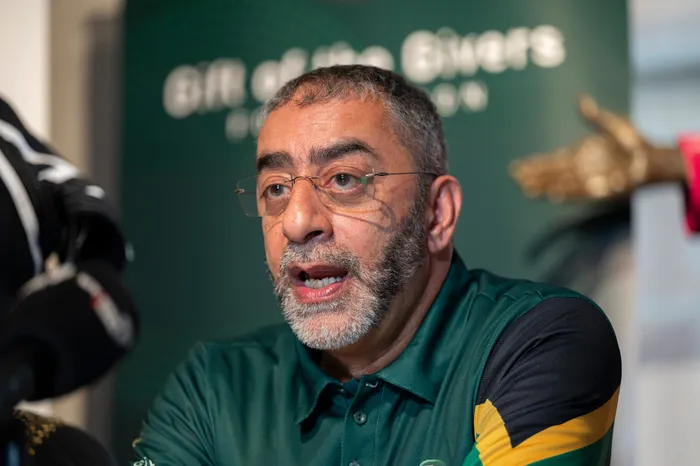
Humanitarian and founder of Gift of the Givers, Dr Imtiaz Sooliman.
Image: Armand Hough/ Independent Newspapers
SOUTH AFRICA belongs to all who live in it, and its citizens have a collective responsibility to address its problems.
This was the sentiment of renowned humanitarian, and founder of Gift of Givers, Dr Imtiaz Sooliman who has been named among President Cyril Ramaphosa’s Eminent Persons Group, selected to champion the much anticipated National Dialogue.
The president first made mention of a National Dialogue during his State of the Nation address in February. The dialogue aims to tackle the persistent challenges faced by the country despite 30 years of democracy including poverty, crime, inequality, unemployment, social divisions and a growing disconnect between citizens and institutions, among others.
On Tuesday, Ramaphosa announced 31 names set to champion the initiative. The group includes leaders in civil society, business, labour, religious institutions, cultural workers, sports organisations, women, youth and community voices.
Among those on the list are Springbok captain, Siya Kolisi; Anglican Archbishop of Cape Town Thabo Makgoba; former Minister and constitutional negotiator Roelf Meyer; peace activist Ela Gandhi, former MP Lindiwe Mazibuko; Miss South Africa 2024, Mia le Roux; former Constitutional Court judge, Edwin Cameron; chairperson of the National Planning Commission, Professor Tinyiko Maluleke and award-winning actor Dr John Kani.
The president said the dialogue would be a “participatory process” that unfolds in phases, from local consultations and sectoral engagements to provincial and national gatherings.
The first National Convention has been scheduled for August 15.
Sooliman expressed enthusiasm about the change this initiative could bring.
“When the government can ask the public for assistance it shows humility. No country can run without citizens getting fully involved. I also want to send a positive message. We always get negative messages; ‘oh it can’t be done’, ‘it’s a rubber stamp’, but I feel this time there can be a difference. We can work together and in the interest of the people of our country. I am interested because I’m a patriot, I know I can add value with my skills. But more than that, the fact that the government came and said can you guys help, it’s a big ask.”
“My aim for a start is to develop to see that we have all the right people, there's a youth element missing. Youth are the best people to put forward their own vision and their own complaints. I know it’s an eminent persons group, older people are experienced, but you need to get the requirements of young people.
“Secondly I would like them to consult across a wide spectrum. I want to come not only with the problems, I want to come with the solutions. I don’t want to be on the rubber stamp committee, when we make a proposal we want to see action. People need help now.”
He made an example of water supply problems which needed infrastructure solutions, instead of only providing water bottles which provided short term intervention.
“Several people (in the group) are competent with different experiences. We can do multiple interventions at the same time.
“A lot of people want to give free services, they want to give advice, we need to create the opportunity for that to happen. The fact that they’ve asked civil society to come and help the government is a great step forward,” Sooliman said.
“There’s only one way to build this country. The government is only custodians of this country, it belongs to all of us, we all have a responsibility collectively to make it work. The mechanism has to be there; the government has to allow the door for civil society to come in which they’ve done now. It’s a very bold step, I say let’s hold their hand, let’s do it together,” he concluded.
Banyana Banyana coach, Dr Desiree Ellis said she wanted to contribute and make a meaningful change to the country.
Reflecting on her personal experiences she said: “I think from where I come from, Hanover Park, the communities are not safe. It’s not safe for kids, it’s not safe for anyone anymore. When I grew up I used to regularly play outside. I don’t think it’s safe to play outside and I think that needs to change. That has helped me and it has shaped me, I could play outside without fear. (It’s) very important for communities to be safe again, where we look out for each other, where we take care of each other. ”
For women and sport, Ellis said participation was important.
“There are still some international players that have to pay to participate and I don’t think that should happen. (I want) to make sure we also bring sports back into schools. That shaped me, I could participate in sport in school, I played hockey at school, I could do athletics at school. That is the foundation phase.”
She added that GBV needed to be addressed urgently.
“That is one of the biggest challenges we face in the country and it's something we need to make a bigger impact in making sure we reduce GBV cases.
“It's important for us all to make a contribution, to make a change. This is our country, we live here, we have a beautiful country and lets get back to making it beautiful again.”
Cape Times